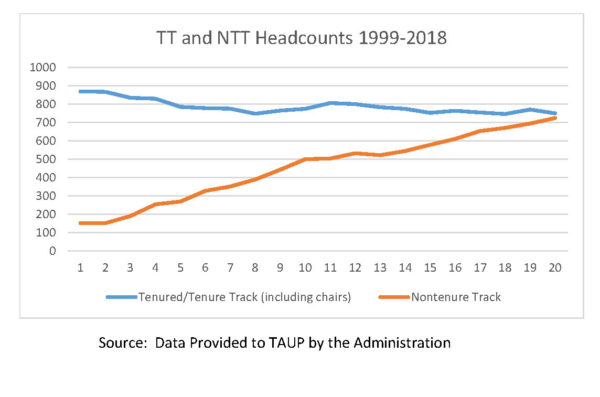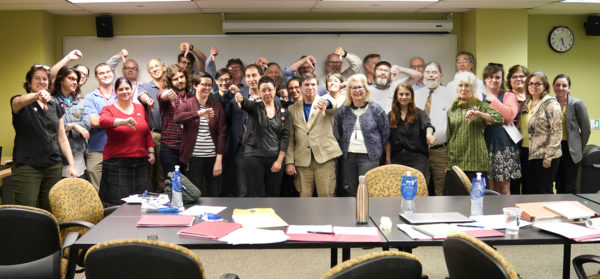TAUP and the administration met to work toward an early settlement of the contract on Friday, 5/3 and Monday, 5/6.
Thanks to our decision to engage in open bargaining, we were again supported at both sessions by a group of 20 members, in addition to our table team, from a range of colleges and schools, ranks, and tracks. Their presence strengthened our resolve in representing the 2500+ faculty, librarians and academic professionals in our bargaining unit, and their observations and suggestions when we went into caucus were very insightful and helpful. Those who have attended have found negotiations exciting and informative, and we invite you to join us at our next sessions on May 16th, May 21st, and May 23rd–RSVP here.
Over the course of these two sessions, we addressed proposals that speak individually to all of the tracks of faculty in our bargaining unit—tenured and tenure-track, full-time non-tenure track, and adjunct. We have also put proposals on the table for librarians and academic professionals and proposals that benefit all of our members. This is who we are as a union; we reject the narrow and divisive proposition that one group can benefit only at the expense of the other. Temple has the resources and should have the vision to be better than that. Our university must be better than that.
At Friday’s session, we put the following proposals on the table:
- Job Security for Full-Time Non-Tenure Track Faculty:
○ Two major reviews, the first normally occurring in the third year of service and the second normally occurring in the sixth year
○ A successful first review normally results in a contract of three years or longer; a successful second review normally results in a renewable contract of three years or longer
○ NTTs can appeal a non-renewal under certain conditions
○ All adjuncts in the bargaining unit would receive a 50% subsidy (those teaching 4 credits or less currently receive a 25% subsidy)
○ The prescription plan in the full-time plan would be added
○ Adjuncts who have previously received health insurance as grad students would be eligible for health insurance their first semester as adjuncts. Currently, adjuncts are not members of TAUP until their second semester; this has resulted in many grad students being ineligible for any health care subsidy during their first term as adjuncts.
- NTT Sabbaticals: NTTs can apply for sabbaticals every 7 years rather than every 10 years
- Hardship Withdrawals from Retirement Accounts: Members can withdraw money in case of hardship, the terms as defined by the IRS, rather than being allowed only to borrow against their accounts.
We also emailed a proposal on Vision Care, which would add a subsidy for those who have special needs prescriptions (such as a heavy correction).
We have now made almost all of our proposals for early settlement; the only ones left have to do with Academic Professionals, a subset of members including academic advisors in CLA, among others. We are holding off until we receive a clarification on their salary data.
For a summary of our other proposals to date, see here.
We have not yet received any counter-proposals from the administrative team or proposals on other issues. But on Friday and Monday, their representatives did ask some questions and made some remarks that members should know about.
NTT Job Security
In introducing our NTT Job Security proposal, we noted that it has been almost 20 years since the removal of the six-year cap on NTT service at Temple. This means that we have many hundreds of NTTs spending their careers at Temple. It is past time for Temple to follow universities like Rutgers, CUNY, Michigan and many others in offering stronger job security to these valuable faculty members.
The administrative team responded that Temple doesn’t compare itself to other schools. We replied that the administration does this all the time– for instance, when it emphasizes its status as an R1 Research University or when in recent negotiations where the administration’s arguments relied on comparisons with peer universities. But we also maintained that regardless of whether the university compares itself to other schools, there is a compelling case for Temple to provide job security for NTTs.
The administrative team then asked some useful questions about the details of the NTT proposal.
Adjunct Healthcare
Currently, only 6% of eligible adjuncts have elected to use the benefit negotiated in the first contract. While there may be many reasons for this, our bargaining survey indicated that a major cause for low enrollment is the expense, which informs our proposal that all adjuncts be given a 50% subsidy. By comparison, full-time members receive a 77% or 80% subsidy depending on their income. Another reason for low enrollment is that the plan does not provide sufficient coverage, which is why we are proposing that a prescription plan be included. This led to some discussion of the possible cost of adding such a plan, and the administrative team agreed to provide data on how this might affect premiums.
Our proposal on behalf of grad students who are first-time adjuncts was rejected by the administrative team on the grounds that we do not represent them; they also objected to the presence of Evan Kassof, the President-Elect of TUGSA, whom we had invited to join us at the table. The urgency of addressing the loss of health care that grads face moved us to take this step; without a subsidy, many cannot afford the insurance that is available. The administrative team agreed to meet with graduate students in this difficult situation to see if a solution could be found. Both TAUP and TUGSA will continue to watch as this moves forward.
Adjunct Job Security
On Monday, the administrative team asked questions about our adjunct job security proposal, which provides a way for adjuncts to be evaluated to gain priority in hiring and longer-term contracts as well as to be informed of full-time job opportunities. We reviewed the proposal with them to clarify questions and to include their input where appropriate. It was encouraging to be in discussion about how a proposal like this could be workable, and we appreciated the administration’s questions and suggestions.
Tenure Track Percentages and Hiring
This proposal aims to make concrete the declaration in the contract that “TAUP and Temple shall express their joint commitment to tenure and the need to have a sizable complement of tenured and tenure-track faculty in a high-quality research university.”
To counter the damaging erosion of tenure-track faculty, we have proposed that by the end of the new contract there be a net gain of 70 tenured and tenure-track faculty or a gain of 1% per year of tenured and tenure-track faculty as a percentage of the faculty as a whole, whichever is higher. To support our claim that the decline of tenured-track faculty is a crisis, we distributed the chart below, which records the headcount of tenured and tenure-track and full-time nontenure-track faculty in the bargaining unit over the last 20 years.

(The administration has been obliged to provide us with data on adjuncts in the bargaining unit only since the ratification of the first adjunct contract in 2017. The chart includes chairs because even though they are not in the bargaining unit when serving as chairs, they are before and after their service. Note that it also assumes that all chairs are tenure-track faculty although there are some NTTs currently serving as chairs.)
The administrative team asked why we were privileging tenure/tenure track jobs over others, and argued that an increase in tenured and tenure-track hiring would necessarily lead to a decrease in NTTs and adjuncts. We rejected this latter claim; indeed, the graph above shows increases in TTs and NTTs in 2006-2009, 2014, and 2017. We are concerned that these questions are designed to pit us against each other as we seek more job security for those without it as well as a larger base of tenured faculty.
The administrative team rejected the proposal for 70 new hires, saying they would not agree to a “quota”. When asked how the problem of diminishing tenured numbers should be solved, they responded by saying that they weren’t sure if there is a problem or not.
The administrative team then argued that TAUP’s positions were contradictory, and that equity and parity for contingent faculty cannot be argued for as we push for the importance and value of tenured and tenure-track faculty. But we believe that the ongoing erosion of the tenured and tenure-track faculty threatens our status as “a high-quality research university,” as the contract phrases it. Moreover, we have tied parity to specific proposals–for instance, NTTs spending their careers at Temple should receive the same pension match as tenured/tenure track faculty, or that our aim for adjuncts is that they ultimately receive per credit hour the minimum that full-time faculty receive (and there are very few full-time faculty who receive the minimum). We believe there is no contradiction in pursuing these things simultaneously. Again, we believe that in addition to seeking information about our positions in making these claims, the administration may be trying to pit us against each other in order to weaken our power at the table, which comes from TAUP members acting in solidarity. This strategy, if attempted, will fail.
The key values informing the negotiations were stated at our May 1st rally: respect, equity, and job security. And, as we said at the table Monday, our proposals are designed to make it possible for all our members to do the best job they can in research, teaching, and service so we can advance knowledge and so students can benefit from the full potential that each person has to offer.
We look forward to working with the administration in coming to an agreement on these goals. Again, our next bargaining sessions are on May 16th, 21st, and 23rd; please let us know if you can attend!


